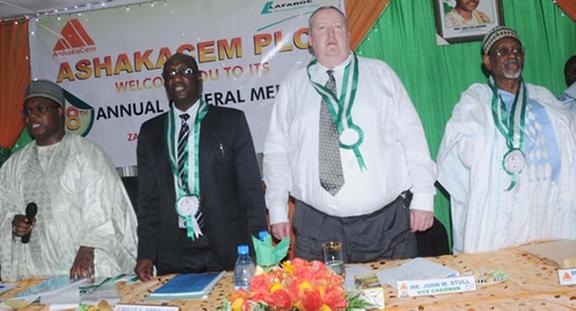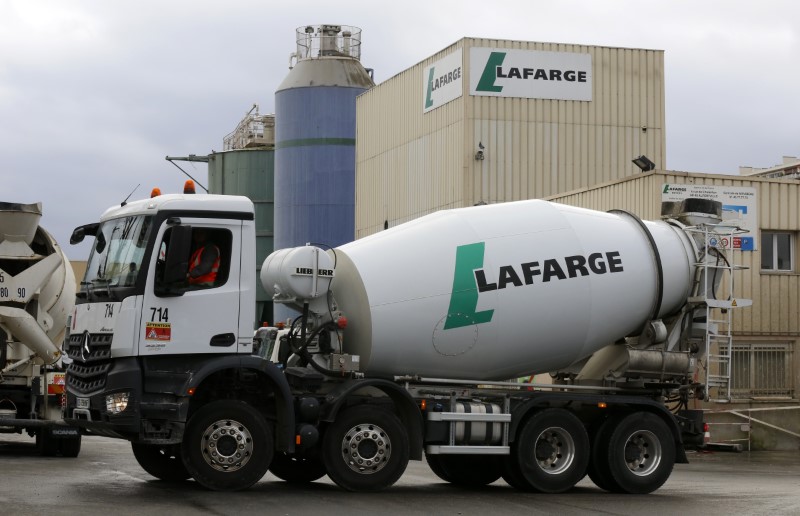Economy
FY17: Lafarge Africa Board Okays N1.50k Cash Dividend Payment

By Dipo Olowookere
The board of directors of Lafarge Africa (Lafarge Africa) Plc has approved the payment of N1.50k per share dividend to shareholders.
This information was revealed in a statement issued by the company.
In the statement, the cement manufacturer explained that the decision to approve the payment of the cash dividend was taken at the board’s meeting held last Friday.
However, it was emphasised that the dividend payment is “subject to the ratification of members at the Annual General Meeting” slated for Wednesday, May 16, 2018.”
Furthermore, it was said that the “dividend of N1.50k per share will be paid to shareholders whose names appeared on the Register of Members on April 20, 2018.”
In addition, the dividend payment is “from the 2012/2013 pioneer profit of the company and not subject to deduction of withholding tax in respect of the year ended December 31, 2017.”
In the results released last week, the company said it recorded a loss after tax of N34.6 billion in the period under review in contrast to the N16.9 billion profit in 2016.
Also, last year, the firm said it had a loss before tax of N34 billion compared with the N22.8 billion loss two years ago, when the country was in economic recession.
However, the revenue generated by Lafarge Africa in 2017 appreciated by 36.2 percent to N299.2 billion from N219.7 billion in 2016.
Furthermore, the gross profit posted by the company increased by 24.8 percent to N50.8 billion last year from N40.7 billion two years ago.
But the operating profit went down to N7.9 billion in 2017 from N12.4 billion recorded in the previous year. This was mainly due to amount used up by the firm on administrative expenses and other operating expenses.
A look at the balance sheet of Lafarge Africa Plc showed that as at December 31, 2017, the total assets were worth N577.7 billion against N501.4 billion in 2016, while the total liabilities were N420.7 billion last year in contrast to N252.4 billion two years ago.
Economy
Fidson, Jaiz Bank, Others Keep NGX in Green Territory

By Dipo Olowookere
A further 0.99 per cent was gained by the Nigerian Exchange (NGX) Limited on Friday after a positive market breadth index supported by 53 price gainers, which outweighed 23 price losers, representing bullish investor sentiment.
During the trading day, the trio of Jaiz Bank, Fidson, and NPF Microfinance Bank chalked up 10.00 per cent each to sell for N11.00, N86.90, and N6.27, respectively, while Deap Capital appreciated by 9.96 per cent to N7.62, and Mutual Benefits increased by 9.94 per cent to N5.42.
Conversely, Secure Electronic Technology shed 10.00 per cent to trade at N1.62, Sovereign Trust Insurance slipped by 9.73 per cent to N2.32, Ellah Lakes declined by 7.91 per cent to N12.80, International Energy Insurance retreated by 5.56 per cent to N3.40, and ABC Transport moderated by 5.26 per cent to N9.00.
Data from Customs Street revealed that the insurance counter was up by 2.52 per cent, the industrial goods sector grew by 2.28 per cent, the banking space expanded by 1.43 per cent, the consumer goods index gained 1.23 per cent, and the energy industry rose by 0.05 per cent.
As a result, the All-Share Index (ASI) went up by 1,916.20 points to 194,989.77 points from 193,073.57 points, and the market capitalisation moved up by N1.230 trillion to N125.164 trillion from Thursday’s N123.934 trillion.
Yesterday, investors traded 820.5 million stocks valued at N28.3 billion in 63,507 deals compared with the 898.5 million stocks worth N38.5 billion executed in 61,953 deals, showing a jump in the number of deals by 2.51 per cent, and a shortfall in the trading volume and value by 8.68 per cent and 26.49 per cent apiece.
Closing the session as the most active equity was Mutual Benefits with 79.0 million units worth N427.1 million, Zenith Bank traded 44.0 million units valued at N3.8 billion, Chams exchanged 43.9 million units for N182.0 million, AIICO Insurance transacted 42.4 million units valued at N179.8 million, and Veritas Kapital sold 36.0 million units worth N90.6 million.
Economy
Brent Climbs to $71 on Fears of US Military Action Against Iran

By Adedapo Adesanya
The price of Brent crude oil grade went up by 0.14 per cent or 10 cents to $71.76 per barrel on Friday as investors worried about US military action against Iran, as President Donald Trump presses the Islamic Republic to halt nuclear weapon development.
However, the US West Texas Intermediate (WTI) crude oil grade finished at $66.39 a barrel after going down by 4 cents or 0.06 per cent.
The market awaited developments in the struggle between Iran and the US after President Trump said, “We have to make a meaningful deal, otherwise bad things happen,” referring to Iran.
The main concern for the crude oil market is that military activity will lead to a supply disruption if Iran decides to block shipping in the Strait of Hormuz. About 20 per cent of the world’s oil consumption passes through that waterway. Conflict in the area could limit oil entering the global market and push up prices.
There is the fear that a potential US military campaign in Iran could disrupt shipping in the Middle East are also adding upward pressure on supertanker rates.
Traders and investors ramped up purchases of call options on Brent crude in recent days, betting on higher prices.
Also supporting oil were reports of falling crude stocks and limited exports in the world’s biggest oil-producing and exporting countries. US crude inventories dropped by 9 million barrels as refining utilisation and exports climbed, an Energy Information Administration (EIA) report showed on Thursday.
Markets were also considering the impact of ample supply, with talks of the Organisation of the Petroleum Exporting Countries and its allies (OPEC+) leaning towards a resumption in oil output increases from April.
Eight OPEC+ producers – Saudi Arabia, Russia, the United Arab Emirates, Kazakhstan, Kuwait, Iraq, Algeria and Oman will meet on March 1. The eight members raised production quotas by about 2.9 million barrels per day from April to the end of December 2025, equating to about 3 per cent of global demand, and froze further planned increases for January through March 2026 because of seasonally weaker consumption.
Meanwhile, the oil market shrugged off a US Supreme Court decision ruling unconstitutional President Trump’s use of a law to levy tariffs in national emergencies.
Economy
PENGASSAN Kicks Against Tinubu’s Executive Order on Oil, Gas Revenues
By Adedapo Adesanya
The Petroleum and Natural Gas Senior Staff Association of Nigeria (PENGASSAN) has faulted the Executive Order signed by President Bola Tinubu on oil and gas revenues.
President Tinubu this week signed the Executive Order, titled The Upstream Petroleum Operations Cost Efficiency Incentives Order (2025), to safeguard and enhance oil and gas revenues for the Federation, curb wasteful spending, eliminate duplicative structures in the sector, and redirect resources for the benefit of the Nigerian people.
However, at a press conference in Abuja, PENGASSAN president, Mr Festus Osifo, argued that the tax incentives granted to oil companies by the President may not help in the reduction of cost if insecurity is not addressed.
“The Executive Order signed by the President yesterday is a direct attack on the provisions of the Petroleum Industry Act (PIA)—specifically Sections 8, 9, and 64,” Mr Osifo said.
“What the President has done is use an Executive Order to set aside a law of the Federal Republic of Nigeria. This is deeply troubling. What signal are we sending to investors and the international community?
“We are effectively telling them that the law of the land can be set aside by a simple executive decree. This is an aberration and should never have happened.”
According to a statement by the presidential spokesperson, Mr Bayo Onanuga, the President signed the EO in pursuance of Section 5 of the Constitution of the Federal Republic of Nigeria (as amended).
The Executive Order is anchored on Section 44(3) of the Constitution, which vests ownership, control, and derivative rights in all minerals, mineral oils, and natural gas in, under, and upon any land in Nigeria—including its territorial waters and Exclusive Economic Zone—in the Government of the Federation.
The directive seeks to restore the constitutional revenue entitlements of the federal, state, and local governments, which were removed in 2021 by the Petroleum Industry Act (PIA).
According to Mr Onanuga, the PIA created structural and legal channels through which substantial Federation revenues are lost via deductions, sundry charges, and fees.
Under the current PIA framework, NNPC Limited retains 30 per cent of the Federation’s oil revenues as a management fee on Profit Oil and Profit Gas derived from Production Sharing Contracts, Profit Sharing Contracts, and Risk Service Contracts. Additionally, the company retains 20 per cent of its profits for working capital and future investments.
The federal government considers the additional 30 per cent management fee unjustified, as the 20 per cent retained earnings are already sufficient to support NNPC Limited’s functions under these contracts.
Moreover, NNPC Limited also retains another 30 per cent of profit oil and profit gas under the Frontier Exploration Fund, as stipulated in sections 9(4) and (5) of the PIA.
-

 Feature/OPED6 years ago
Feature/OPED6 years agoDavos was Different this year
-
Travel/Tourism10 years ago
Lagos Seals Western Lodge Hotel In Ikorodu
-

 Showbiz3 years ago
Showbiz3 years agoEstranged Lover Releases Videos of Empress Njamah Bathing
-

 Banking8 years ago
Banking8 years agoSort Codes of GTBank Branches in Nigeria
-

 Economy3 years ago
Economy3 years agoSubsidy Removal: CNG at N130 Per Litre Cheaper Than Petrol—IPMAN
-

 Banking3 years ago
Banking3 years agoSort Codes of UBA Branches in Nigeria
-

 Banking3 years ago
Banking3 years agoFirst Bank Announces Planned Downtime
-

 Sports3 years ago
Sports3 years agoHighest Paid Nigerian Footballer – How Much Do Nigerian Footballers Earn













